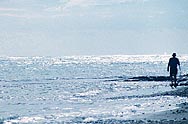Posted on: Sunday, March 4, 2001
Distant lights, distant dreams
By John Griffin
Former editor of The Advertiser's editorial pages
The title character in F. Scott Fitzgerald’s 1920s Jazz Age novel "The Great Gatsby" spends hours staring across a Long Island bay at a light on the dock fronting the house of an unattainable woman.
 |
| The glittering sand and water of Diamond Head Beach Park: We must see what attracts us from afar.
Advertiser library photo • June 7, 2000 |
Many of us know how he felt. But this is not a confessional column about unrequited attractions. It’s about distance and desires in all our lives.
Another view:
From where we live in Kaimuki, you can see the lights on Moloka‘i, including those of the upland ranch town of Maunaloa. Sometimes I have looked and wondered how it would be to live on the rural "Friendly Isle," which was earlier called the Lonely Island. Would it be friendly, lonely or both?
I didn’t find the answer on a short recent visit to Maunaloa. For, despite its small size, Moloka‘i remains a complicated place with precious few jobs, great pride of culture, and modest pleasures that include semi-big-league shopping when containers of Kmart goods come over on the barge a couple of times a year.
One of the after-dinner pleasures was sitting on the cool lanai of the Moloka‘i Ranch Lodge and looking at the lights of Kaimuki and other parts of East O‘ahu. Moloka‘i people talked to us about their being attracted back and forth.
Perhaps with the help of a warmed cognac, I even experienced a modest epiphany:
Looking in the distance and sometimes longing are part of many lives. Maybe we all have those lights in our minds. It can be a motivating mystery — or destructive.
One of the first short stories I remember reading as a child may have dealt with this. It told of a boy who grew up on the side of a valley. Each day he awoke to see there was a house with golden windows across the valley.
He longed to see that magic house up close and when he was older spent a day hiking across the wooded valley to the house. There he was told by another child that the real house with golden windows was across the valley at sunset.
Then what he saw was his house. And the children realized that the gold was really the sun shining on glass windows at sunrise and sunset.
Readers can draw their own moral from that story. But for me it was not about deceptive optics or how it’s best to stay home. Rather it is that you need to go see what attracts you from afar. That led me to Hawai‘i and beyond. It leads more profound people to great art and inventions.
On the people level, the bright lights of Honolulu used to attract Neighbor Islanders, and still do on hard-pressed places like Moloka‘i. But the flow is also reversing from O‘ahu to growing destinations like Maui and the Big Island as people, young and older, follow different kinds of dreams and opportunities.
Early on, ancient Polynesians were drawn to Hawai‘i by legends, another kind of light. Other races came for other dreams, "The Gold Mountain" of many Chinese, for example.
Later for Hawai‘i the Mainland was a lure. Now Las Vegas glitter and gambling draws Hawai‘i folks like moths to a flame. Many from here have gone there and elsewhere on the Mainland to live and work.
That’s not necessarily bad. I have always felt that what was regrettable about Hawai‘i’s "brain drain" was not that promising young people moved away to learn and live. That is natural for many communities, especially those isolated. The sadness has been that Hawai‘i too often has not been dynamic and promising enough to lure back those who want to return.
Maybe we have too often seemed like Moloka‘i writ large, interesting to visit but without enough jobs.
For Honolulu, that may be changing now, at least for those returning younger people with skills that can serve in high tech and bio-tech, e-commerce, post-plantation agriculture, east-west contacts and other segments of a "new economy."
When I came here in 1950, the clear goals for most people seemed a socio-political revolution and statehood. Those were achieved in that dynamic decade.
Now, a half-century later, you can see emerging outlines of something new in the society, economy and politics. Sometimes you can even feel a new longing. Perhaps for Hawaiians the luring light is sovereignty. That’s fine and should be broadly supported. But for the rest — for all Hawai‘i’s people — something even bigger and more inclusive is needed.
In any event, what’s also a must are people who can define such goals, make them realistic and provide leadership.
Until we find them or they emerge, Hawai‘i itself may be much like poor Jay Gatsby looking off at that light of an unattainable dream.
[back to top] |

